
October 2018 - Worldtrip Update
China, our first cultural shock: languages, alphabets, cuisines, social behaviours, liberties, environments, and other aspects of life dramatically changed right at the border on the Kulma Pass.
Until then changes were gradual, from region to region, languages stayed similar, alphabets remained latin or cyrillic, cuisines comforted either european or turkic palates, and our freedoms increased or stayed similar.
Karakoram Highway: N-35
The Chinese border control to the Xinjiang province was the longest and most constraining we have experienced on our trip. The process took about five hours, our luggage was completely searched and scanned, our diverse cameras and SD cards were examined, our laptops inspected, our phones contents were downloaded, and a software was installed on them. We had to answer questions, enter a full body scanner, fill out multiple documents, and then… wait for half an hour on a freezing snowy peak because they refused to let us cycle down to the next checkpoint. The officials eventually stopped an empty truck and forced the driver to take us 15km down the road to the next checkpoint. To some people, bicycles don’t seem to be acceptable vehicles, and telling them you just cycled from Europe to China doesn’t spark any logical reaction in their heads.
Due to the time it took to cross the border, we had little time to cycle and had to find a place to sleep, unfortunately the road is completely fenced of for many many kilometers, it seems to be a bit of a no-man’s land and a weird secured area.
After about 20km, we found a hole in the fence, and a hollow place to setup our tent. It shielded us a bit from the freezing wind coming from the all mighty Muztagh Ata glacier, and hide us from the cops. We shared the view with the camels who were walking in front of the snowy scenery. This evening felt somewhat surreal.
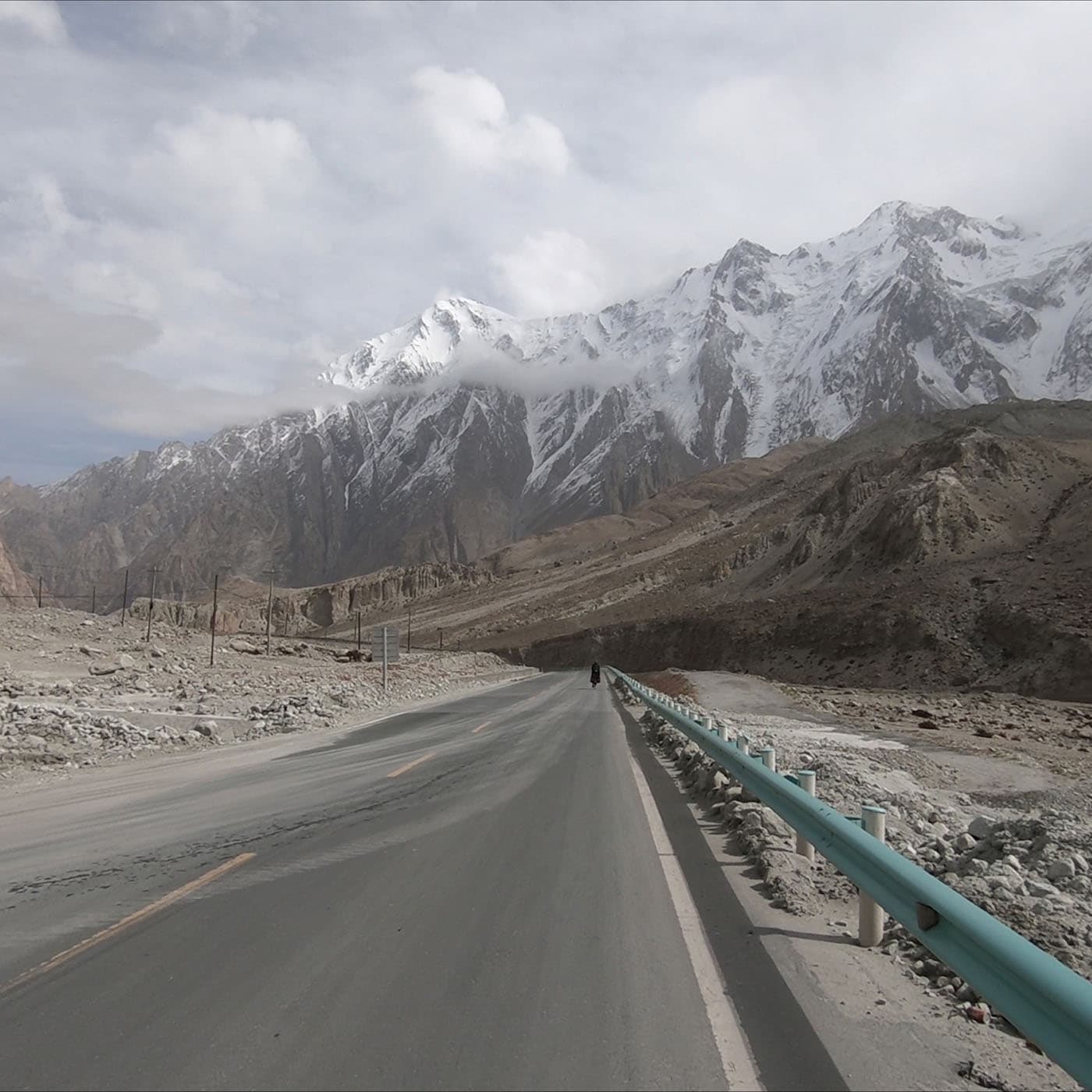
The following day we continued to cycle towards the city of Kashgar, a ~250km ride on the Karakoram Highway, one of the highest highways in the world connecting China to Pakistan.
The broken gravel roads we experienced in Tajikistan were no more, the Chinese roads are wide and in perfect conditions, new tunnels let us cycle through mountains, and long, tall bridges connect everything. I felt like I was just experiencing “Sim City” in real life. New SUVs, modern trucks, and tourist coaches became the norm, no more desolated empty gravel roads.
On this day we ran out of food, we had no Chinese yuan, and were hoping to find a place soon that might either accept US dollars, or have an ATM. Sadly Google Maps cannot be accessed in China, OpenStreetMaps is not always helpful in the middle of nowhere, and Baidu Maps was in Chinese, soooo… we had to switch a lot through different apps to figure out were villages might be located. We could not enter most of them, they were fenced of and guarded by the police.
We eventually found a restaurant, which was also a post office, and also a pharmacy offering traditional chinese medicine.
For some reason hundreds of Chinese tourists gathered there, and suddenly looooads of people wanted to take pictures with us.
After cycling through Tajikistan, we were hungry, we needed to satisfy our appetites that had been on a dry bread and rice diet for weeks. So we ate, a lot. It felt like heaven, an explosion of fragrances, spices, and tastes: ginger, garlic, sprouts, beans, tofu, pak choi, soy sauce, pepper, jasmin rice, omelettes, tomatoes, onions…
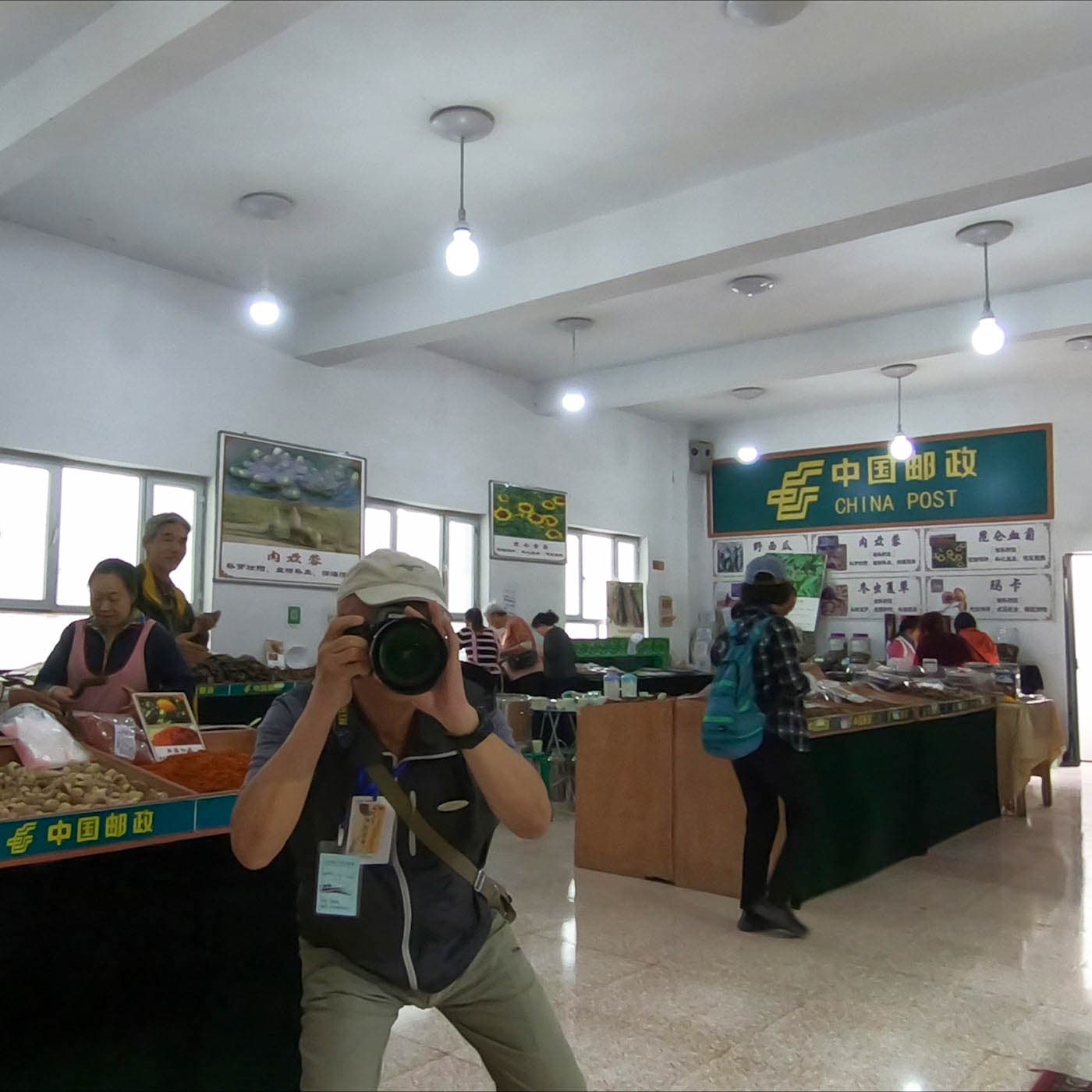
This was also the first time we experienced chinese table “manners”. Slurping, gobbling, smoking, burping, gulping, throwing everything on the ground, eating with open mouthes, etc. Probably completely normal to them, and we knew what to expect in China now.
Kashgar (قەشقەر)
On the road leading to Kashgar, we quickly spotted surveillance cameras every few kilometres, these cameras take pictures of every vehicle passing through it. We thought they were speed cameras, but they just flash everyone, no matter which speed. We also cycled through a few more checkpoints, similar to tollways, except they take no fee, they just scanned our faces and verified our passports.
As we entered the city, the already very present police increased by a threefold. Cops in anti-riot gear on almost every intersection take people out of traffic. The surveillance cameras I mentioned earlier are now flashing us every 500m, it feels strange. To access the touristic old town one has to show an ID, cops are stationned at every road and every alley leading to it, not a problem for us because we are clearly tourists and can just walk through, however every person who’s skin is slightly too dark, or wearing a muslim outfit has to go through an ID check and x-ray their belongings.
The old town is a marvelous relic of the Silk Road, it attests of times were Mongols, Arabs, Turks, and Chinese influenced the architecture and culture of this ancient oasis city. It felt like living an Aladdin tale. So we strolled around the car free area, sighted beautiful old mosques, enjoyed the ancient buildings, and walked around the famous night food market. Ordering food there wasn’t always easy, not all the cooks understand Chinese, Xinjiang is an Autonomus Province, the alphabet is historically Arabic, and the spoken language is Uyghur, a Turkic language. The foods we ordered were for some very spicy, greasy, or sweet, or all together, a combination of bizare and delicious!
Due to our short Chinese Visa, the Taklamakan Desert which covers most of the province to the east, and the many people who’s cycling stories through Xinjiang sounded annoying because of the many police controls. We decided to take a train out to the next province: Gansu. We thought that would be easier, and it certainly was, but it was not that easy.
The train station was a mess. First of, the paranoia was very present, to enter the train station in order to buy tickets, we had to get through a wired fence, two metal detectors, and an x-ray machine. And for some reason, one can not buy a bicycle ticket at the ticket office, one has to go to another building, out of the gate, to the cargo office, and every time you switch buildings, you go through the same hassle again: x-ray, body scanner.
The cargo office, was managed by a single guy, exiting and entering the office to take your order, he did not speak english, he mostly communicated in shouting, and there was a pile of people in front the office trying to reach him to get their delivery, including us, not speaking Chinese, not experienced in shoving people around to get through. So we spend two days trying to buy tickets and trying to get our bikes shipped in the same train. We eventually bought our train tickets online, and only had to handle the cargo in real life, what a pleasure.
The day of our departure, all hell broke loose when the police made us empty our bags, tried to confiscate my beard scissors, and insisted we have a pressurized container, we didn’t. By now we realised cops have no authority, all they do is follow rules, and one of them is “no pointy objects allowed in public spaces in the whole province”, so we started getting loud, preventing them from leaving with my scissors. Then the boss came, oh look someone who speaks english! He asked if the officers were abusive towards us, to which I responded “no, but there is way too much police, and there is no way you can keep the scissors”, after a lot of shouting, we got our scissors back, taped, and he left saying “there is not too much police”, welp you asked.
Gansu province
After 3000km, a lot of instant noodles, two days, and two nights in the same train, we arrived early in the city of Lanzhou. On arrival we went to the cargo office to retrieve our bikes, and they lost them, of course they did. We were hungry, so we gave them a few hours to figure out the situation, and told them we’d be back to either collect our bikes, or get some information about where they are. It turned out for the better, they misplaced the bikes in storage.
From Lanzhou, our goal was to cycle up the Qilian Mountains, into the Gannan Tibetan Autonomous Prefecture, along the Tibetian border. But before we could do that, we needed gasoline for our fuel-stove. In Gansu if you don’t own a car, and don’t have a permit, you can’t purchase gasoline. After trying to buy gasoline at a service station, which did not work, we found a friendly mechanic who rescued us, he dismounted his car’s fuel tank, and gifted us 1L. Unbelievable friendliness, he went through hours of trouble for one liter, and would not accept our money, all he wanted was a selfie!
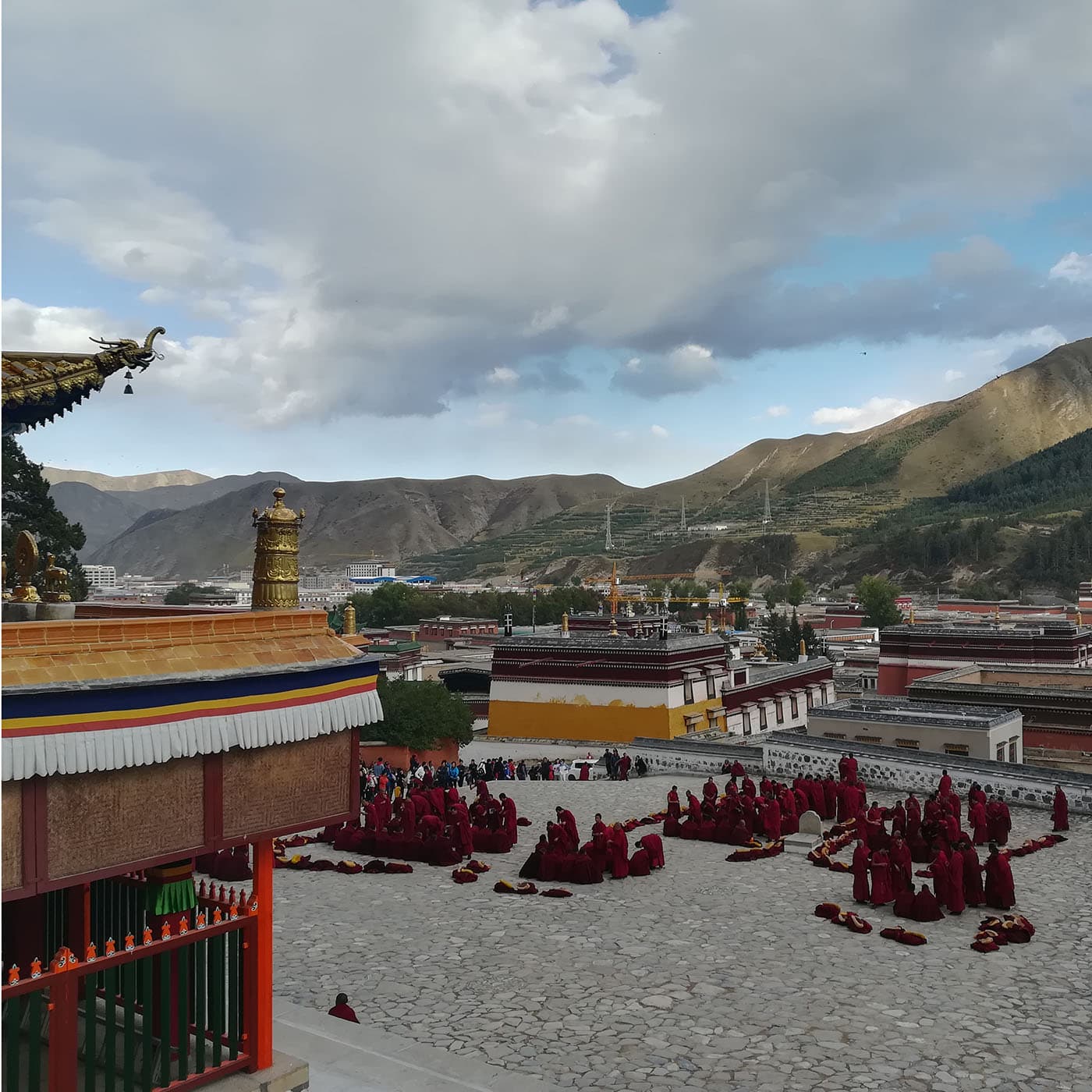
We were now heading to the Labrang Monastery, the most important Tibetan Buddhist monastery outside Tibet. After two days of cycling, the weather turned rainy and cold, and as we cycled through a small village, a Tibetan family invited us to take shelter. We dried and warmed ourselves shivering at the stove. Later, they invited us for dinner, and told us to stay for the night. The women were very active in the kitchen, while the kids and men were entertaining us. I could already smell what they were preparing, spicy pork dumplings, there was no way I could refuse this meal. For one, I was very hungry and there was no vegetarian alternative, in addition they went through hours of effort for their surprise guests, I felt it would be very impolite to refuse. We later discovered that it is a typical Tibetan delicacy and an expensive dish in the region.
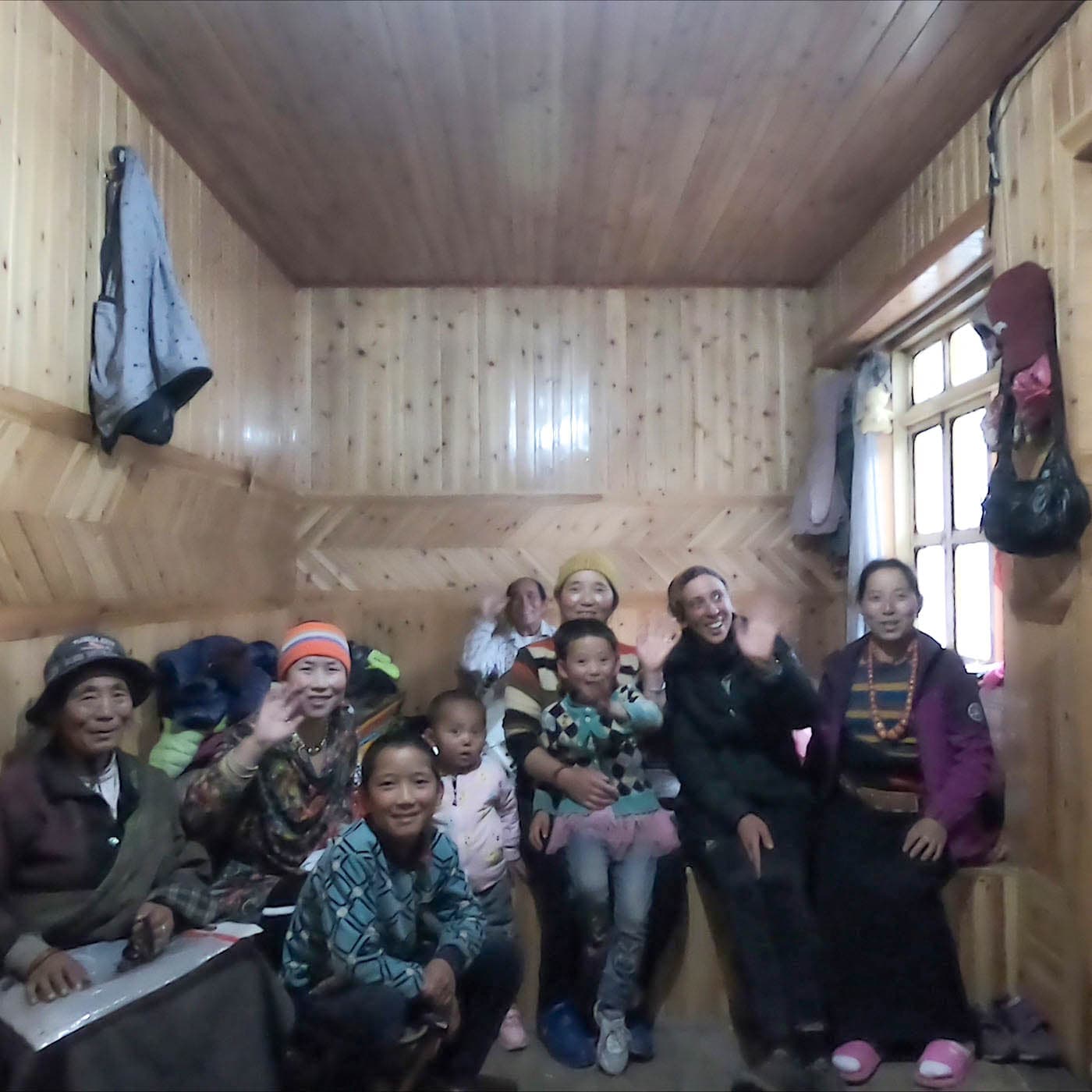
Next morning, after a few more hours in the saddle, we finally arrived in Labrang, a small town overrun by pilgrims, buddhist scholars, and tourists. After the straineous, cold and rainy days in the mountains we decided to stay here for the night and checked into a small hotel right in front the monastery. In order to get a glimpse into the life and architecture of this enormous place, we walked around the monastery walls, and pushed the prayer wheels with the pilgrims.
Yaks, horse races, nomads, and high altitudes accompanied our following days through the grasslands of the Gansu province. When we neared the monastery town of Langmusi, we decided to make a detour to it, to refill our bags with fresh bread, vegetables, fruits, tofu, and rice. All we need as vegetarian bikepackers!
Sichuan province
If you are thinking of pepper, this is because Sichuan pepper has a worldwide reputation, in Sichuan it is added to almost every dish, especially in chinese hot pots and noodle soups. Sichuan has a lot more to offer though, tourists will know it mostly because it is home to many panda sanctuaries, Leshan’s giant buddha, and the massive megalopolises of Chengdu and Chongqing, with a population of 15 and 30 million inhabitants each.
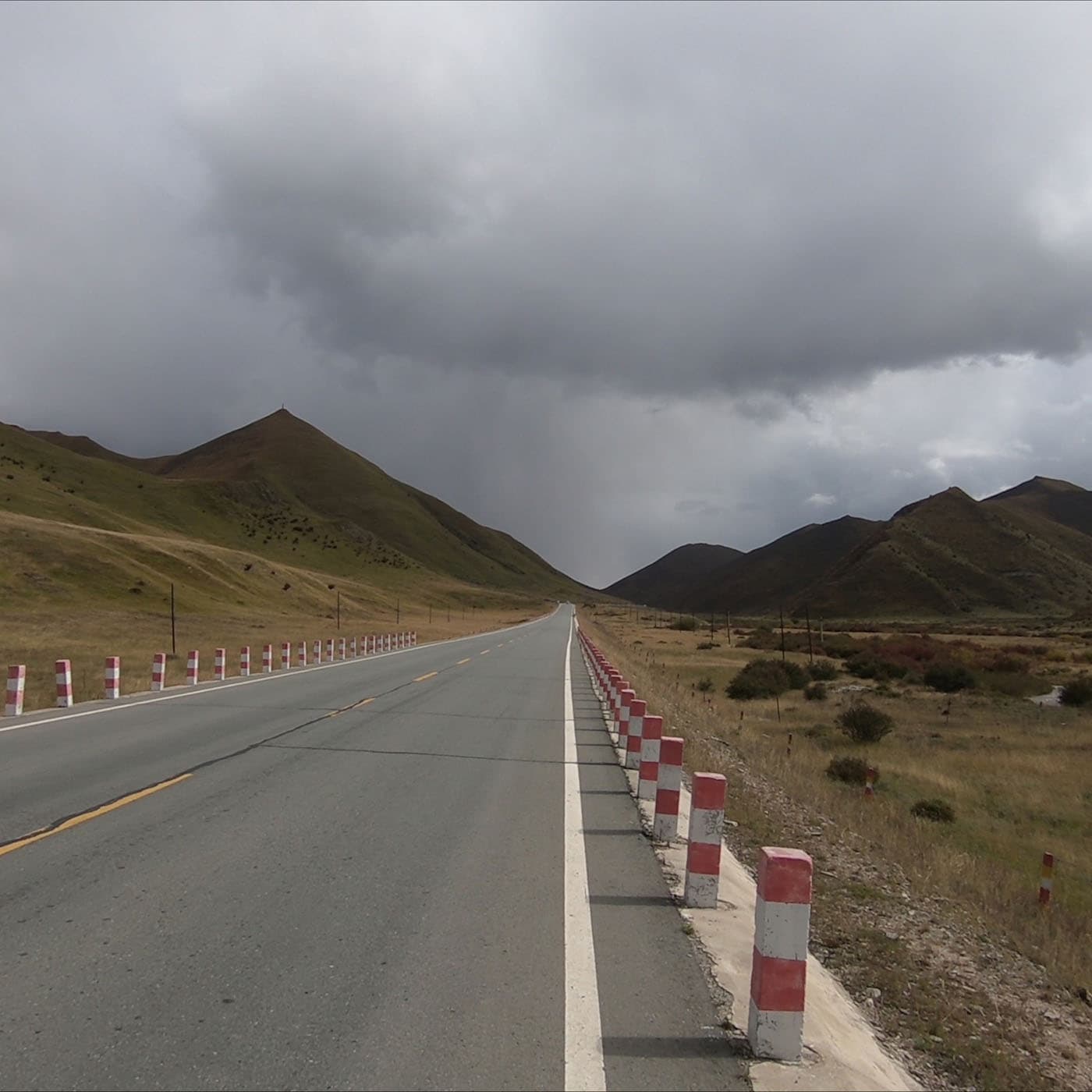
After leaving Langmusi, we entered the Sichuan province, the road became even wider, the grasslands even greener, and the nights freezing. We were now on a cold and windy plateau cycling constantly on an altitude of almost 4000m. On our way to Chengdu, we met another bikepacker in a restaurant: Hauke. Are you german? Yes. “Let’s speak german then 😆”. Hauke accompagnied us for two days, up the last passes before the road took us down to Chengdu.
These passes were not particularly hard, it did snow a bit, the road up to the highest point was very gradual, making for an enjoyable cold ride. Unfortunately, Mimouna’s knee was painful for a few days now, and it wasn’t enjoyable to her. As we almost reached the pass, we decided to take a break at what seemed to be a nomad’s owned horse racing place attracting Chinese city dwellers. Hauke convinced the owners to prepare us lunch, they served us a basic but very tasty meal composed only of rice and sour potato. As we were eating, and discussing our options, Mimouna asked one of the tourist guides if there was a way to take her to Chengdu. As the guides and the bus drivers were trying to figure out it they could fit the bikes, Mimouna felt better from the food and the stove that was heating us. She decided to keep going.
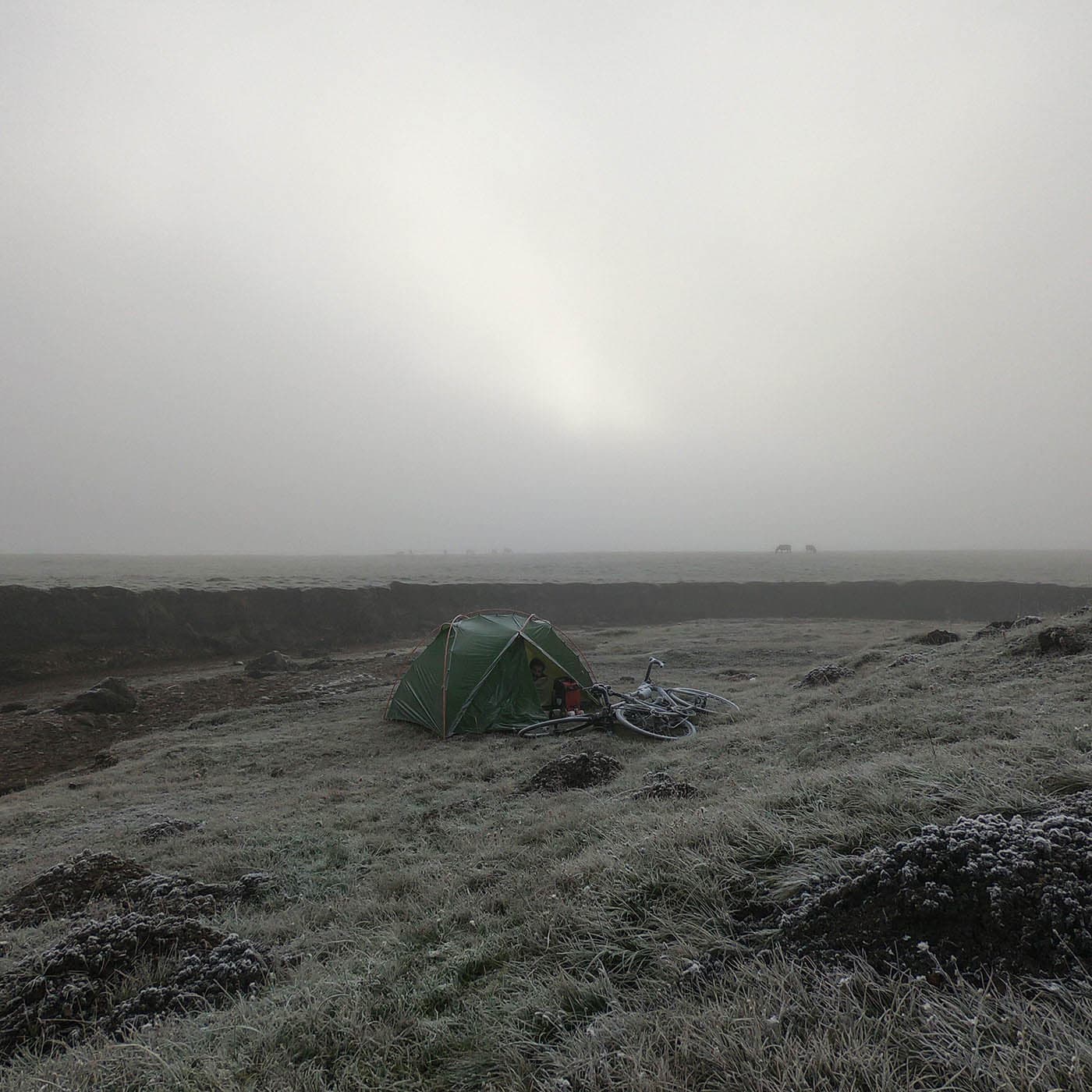
The following day was mainly downhill, sadly Mimouna’s knee was still aching, bringing her to tears, so after 65 kilometres we decided to stop. We took a bus, and rode down the winding and steep roads, and the many very long tunnels down to Chengdu in the comfort of a shaky small bus.
Chengdu
Chengdu is an enormous megalopolis, it feels infinite, and very modern. The subway system is futuristic, despite its size the buildings are low, bike lanes the size of 2 car lanes are the norm, and most people ride electric scooters or bicycles, this combination makes for a comfortable living and a good air quality. In the centre of Chengdu lies a small old town, most tourists gather here to visit the Buddhist Wen Shu Monastery, its beautiful parc, and its nearby alleys. The monastery also hosts a magnificient tea house, and a buddhist vegan restaurant, in which we decided to have dinner on my birthday, yeaaah.
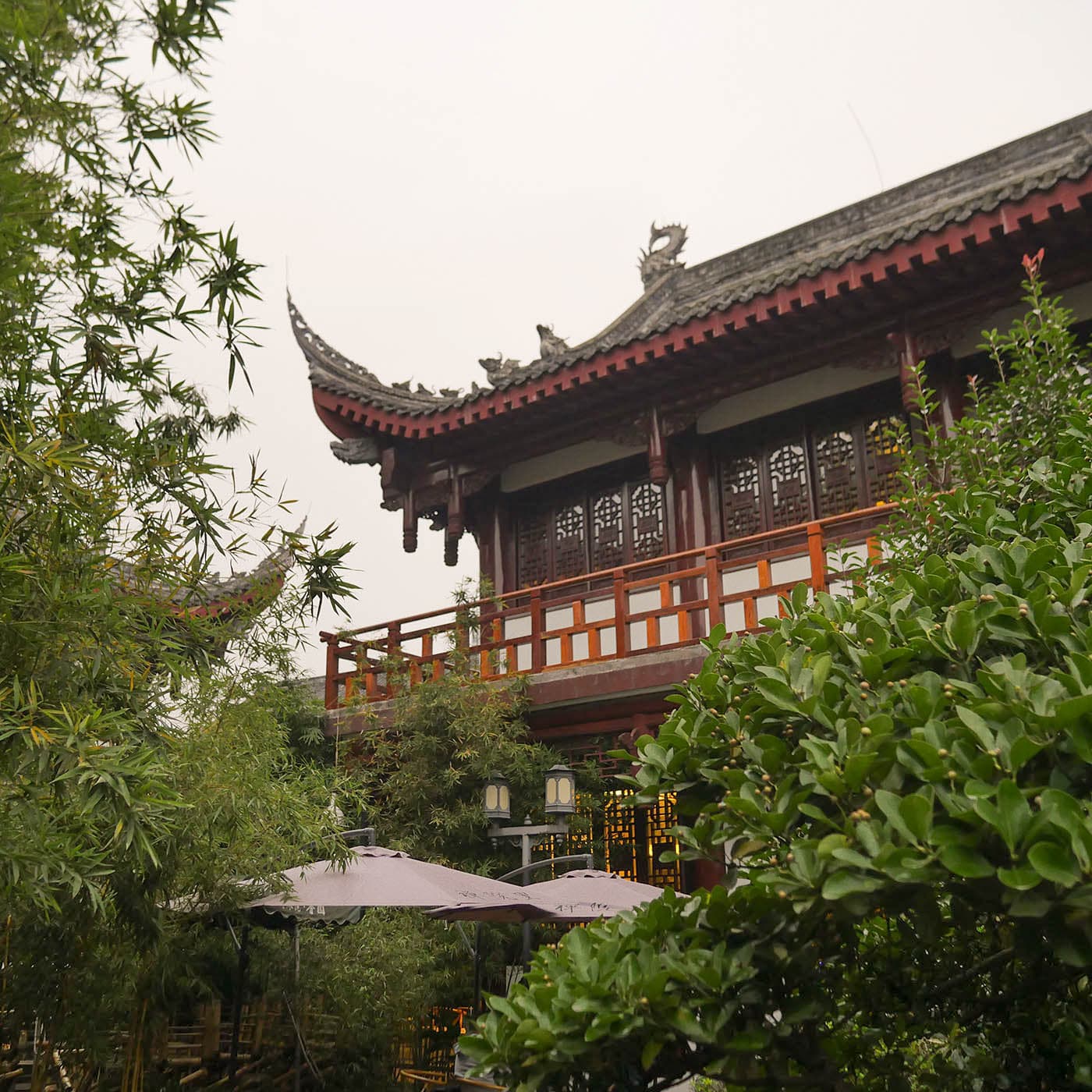
We ordered two hot pots, and cooked a variety of different tofus, vegetables, roots, noodles, and things we didn’t know. Certainly one of the most delicious and amusing dinners I ever had. If you ever happen to be in Chengdu, this is a must try.

We spend days taking care of ourselves, Mimouna’s knee was one of our focuses. Most of the time was spend filling our bellies with delicious foods. We found local biscuit bakers, hell yeah! An endless supply of bubble tea shops, and tried foods such as Mapo Tofu, or Bing, a sort of fresh baked burger bread filled with spicy noodles, or greasy bamboo shoots, delicious.
Given the knee situation, we had no choice but to take another train for 2 days to the next province, Yunnan, to the “spring city”, Kunming.
Kunming
Our plan was to stay in Kunming for a bit, until Mimouna’s knee was healed, and then cycle through the Yunnan province to Vietnam. So we started preparations: planned routes, interesting sights to visit, informed ourselves about border crossings, and acquired Vietnam visas.
Until one day, when Mimouna’s family gave us a call. Her mother endured a difficult surgery, and was now in a comatose state. As the call went on, I opened my laptop and looked for the next flights to Germany. We had less than 24 hours to find boxes for our bikes, explain to our host we need to leave, pack our bikes, call airlines to confirm the bikes and our meal preferences, and get to the airport.
To most people this seems like an easy task, but flying with bicycles requires more preparation, first we needed two bike boxes, for which we needed to find a bike store and by now it was late, stores started closing. The first we cycled to did not exist, instead we were greeted by a 500m² construction site for a new sky scrapper. The second was closed, we got lucky though, the third was just next to it. The owner was friendly and despite the language barrier understood we were in an emergency, gave us the boxes, and whiched us good luck. Now we had to cycle back 5km through a dense rush hour, with heavy and large boxes on our backs. Mimouna even got stopped by an officer at an intersection, she told him “I don’t have time for this” and cycled on.
Now we had to pack or throw out what we couldn’t pack. We were done by midnight. Next morning we called the hotlines, and organized a cab to fit our bikes, again not an easy task, especially when your host is not particularly helpful, but the only person you know who speaks a minimum of english. Eventually we made it to the airport.
After 3 different flights and 36 hours later we where in Germany. Everyone was relieved to be together.
The 3 months we spend in Germany, were both demanding and joyful, Mimouna’s family was really strong, and all family members took excellent care of her mother. She is now enjoying a healthy life again, and we couldn’t be more happy!
So, we were free to continue our escapades, next destination? Thailand!
I hope you liked this blog post. We will tell you more about Thailand in our next article!